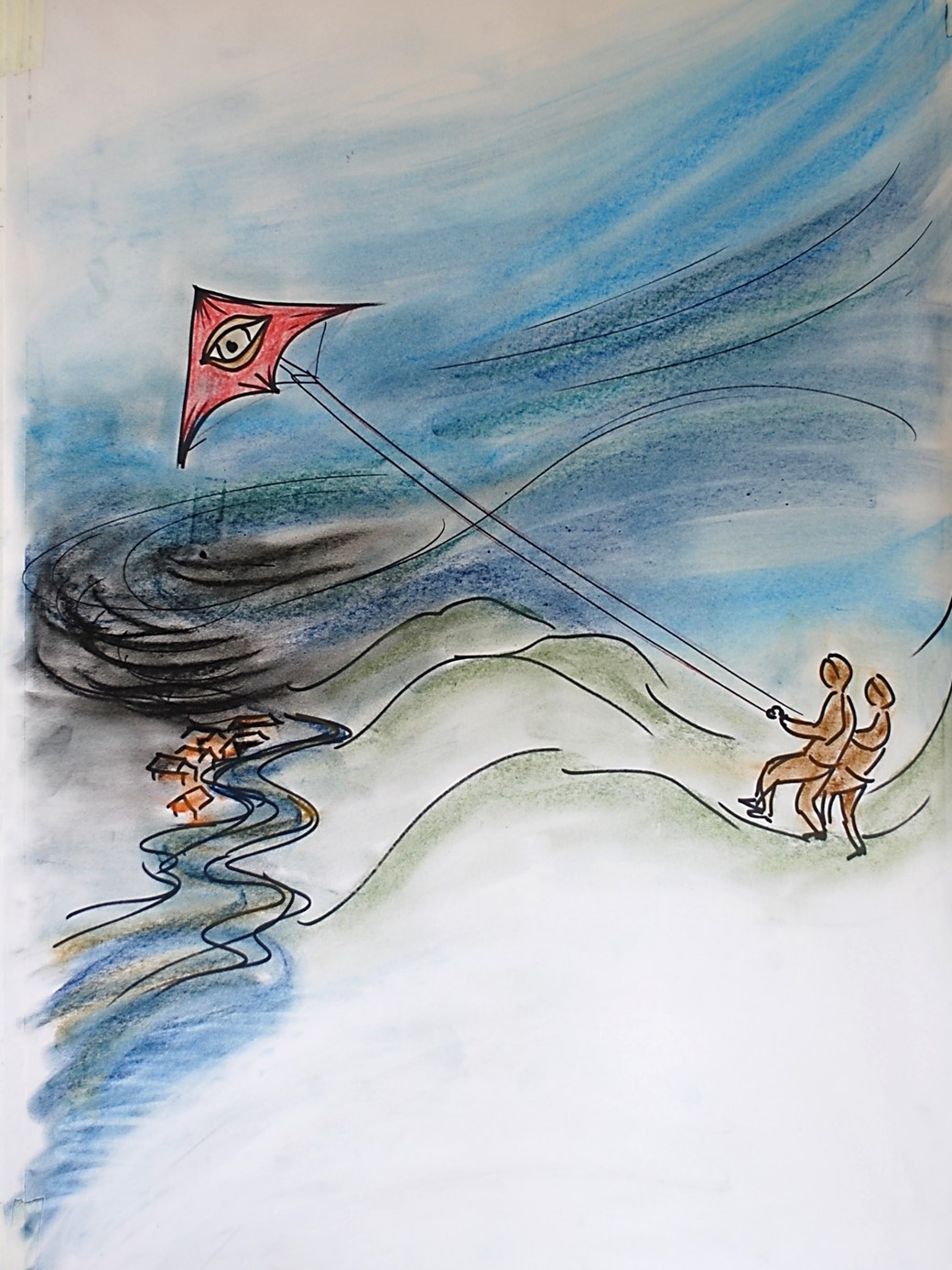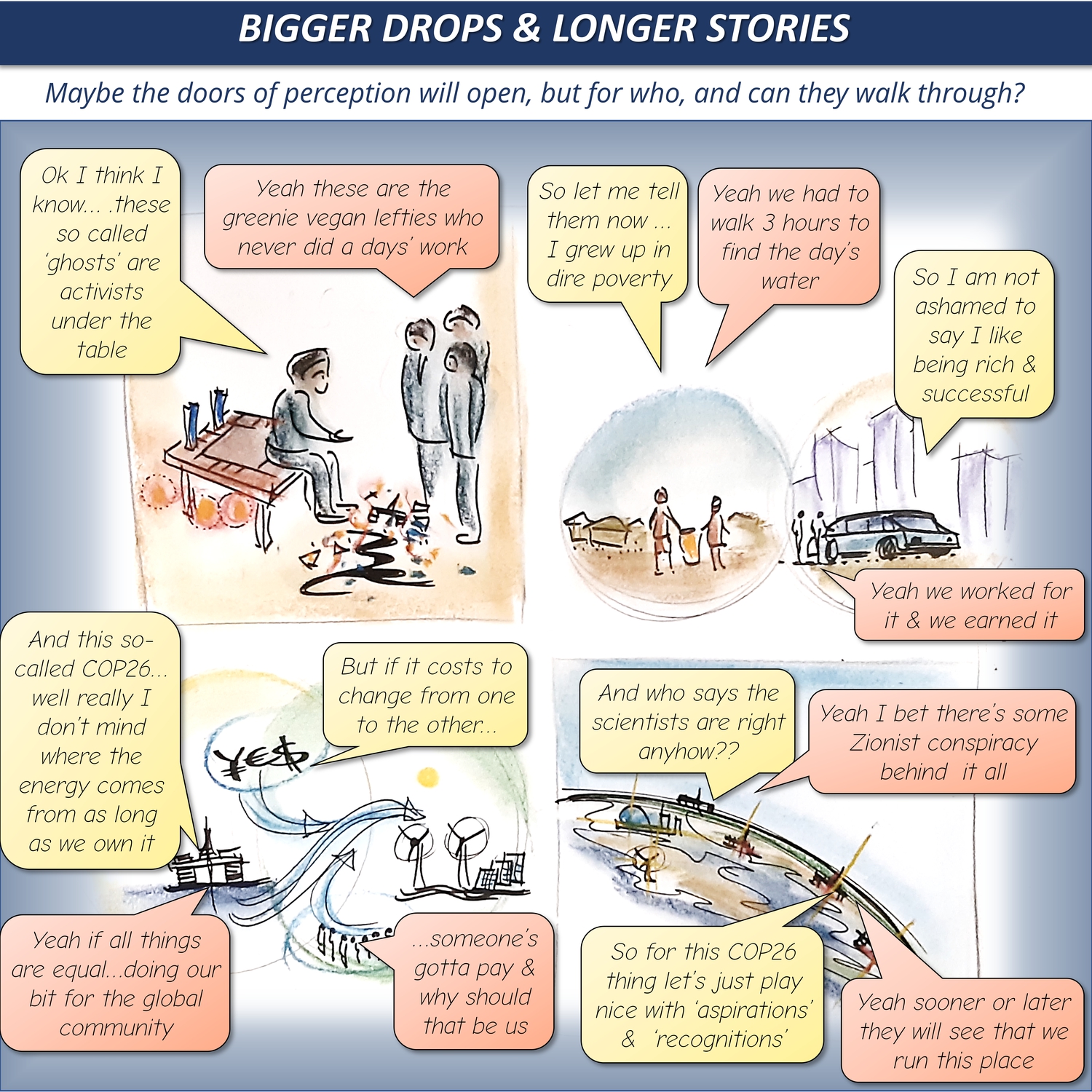Eco-war-3.0: new world disorder
Climate systems catastrophe – cause and/or effect of human systems catastrophe??
More material on the Eco-war Forum
Greetings for Easter 2023 –
- … while technology fuels the geo-political tension – american.edu/sis/centers/security-technology/2034-book-review.cfm
- … scientists issue a ‘final warning’ … https://www.ipcc.ch/assessment-report/ar6/
In response – this Eco-war-3-0/ program ‘thinks the unthinkable’ – could climate change be cause and/or effect of war? For climatic tipping points there is big uncertainty along with big data & big models – but for socio-political tipping points, it’s much more challenging, more about ‘foresight’ and the possibility of a ‘collective climatic intelligence’…
Our next session on 19th April is a focus on the South Asia region (India, Pakistan, Bangladesh, Nepal etc). From the evidence the climatic outlook is challenging –
- Himalayan ice-melt causing floods, droughts, landslides
- Enhanced cyclone & monsoon conditions
- Rapidly increasing drought, wildfire, extreme heat
And what of the socio-political consequences?? Could food & water stress lead to migration, economic crisis, social instability, internal repression, external aggression and geo-political tipping points? Or are there newly emerging qualities of resilience, cohesion and transformation, from local to international?
For this session we aim to present & test a draft analysis of the climatic tipping points / socio-political tipping points for the South Asia region. (See the Ukraine example on Eco-war-3.0 draft).
Eco-wars-3.0 – South Asia region: Weds 19th April 2023 – 1300 BST
Also the full session – Eco-wars-3.0 – “summary for policy makers”: Friday 9th June 2023 – 1300 BST – registration here
BACKGROUND
Fossil fuels already are the flashpoint for global expropriation and confrontation. And if the planetary boundaries are crossed, climatic tipping points are tipped, half a billion people are climate refugees, and a third of the world food supply is at risk, what then? what are the dynamics of escalation into full conflict, and what are the implications for what can be done, today and tomorrow??
This international working group explores the overall question – ‘What is the likelihood of climate change-related world war, and what are the implications?’. As a program of the Laboratory for collective intelligence this Eco-war program is quite ambitious (!) … we aim to explore & map as far as possible, some crucial linkages –
- physical climatic tipping points & societal tipping points (‘SPEC-TP’).
- extreme negative tipping points & potential positive (‘upward’ TP).
- ‘problem-fix’ analysis & ‘collective anticipatory intelligence’ (as per ‘Foresight 3.0’).
While climate change has big science, big models & big data – our knowledge of human systems is often patchy, controversial, weaponized, more about foresight than forecasting… It seems human systems are not only shaped by politics and economics, but by the undercurrents, the deeper traumas and mythologies and contradictions, in which we are all complicit and/or victims. Such ‘big bad world’ effects could include –
- Reinforcing feedback / amplification / escalation loops: (g. drought/ food crisis / migration / extremism)
- Internal tensions / contradictions / suppressed conflicts: (e.g. food price / unrest / insurrection)
- External tensions / schisms / ‘amplified performativity’: (e.g. western hegemony vs radical Islam)
- Embedded relations of power, colonization, expropriation: (e.g. resource curse)
- Deeper cognitive neurosis, trauma, outrage: (e.g. ‘make us great again’)
- Dynamics of ‘weaponization and hijack’: (e.g. manipulation of global food supplies for geopolitical conflict)
- Endemic contradictions, double binds, moral hazards (e.g. eco-gentrification)
- Deeper conflicts of worldviews & mythologies: (e.g. techo-cratic vs eco-centric: humanism vs patriarchy, etc… )
So we aim here at a unique contribution, for the COP28 and others – to bridge the knowledge gap between climate tipping points and human tipping points. Firstly we sketch map the climate-human nexus and its many layers from surface to deeper traumas – then we explore the forward pathways, with the help of synergistic mapping and design…
- Participants are invited to contribute ideas in an interactive process in monthly sessions, for a co-authored paper in Earth Systems Dynamics, and the Foresight 3.0 special issue, along with a SPM ‘white paper’ aiming towards the COP28.
- Further aims are for a community of interest in the Mind-Lab, who can develop and apply such methods & tools, wherever they are useful…
- Further goals are to find practical ways forward in the climate conundrum, by connecting aspirations with realities.
Welcome to join this journey of discovery, in whole or in any part:

Open Sessions
NEXT SESSIONS –
Eco-wars-3.0 – South Asia region: Weds 19th April 2023 – 1300 BST – registration here
Eco-wars-3.0 – “summary for policy makers”: Friday 19th May 2023 – 1300 BST – registration here
All meetings online – link by email in advance – working materials and laboratory space online.
PREVIOUS SESSIONS
Eco-wars-3.0 – Part A ‘Scoping’: October 28th 1600 GMT –
- Guest speaker – Dr Nafeez Ahmed, Unitas Communications
Eco-wars-3.0 – Part B ‘Scenarios’: November 25th 1600 GMT –
- Guest speaker – Prof. Tim O’Riordan, OBE, DL, FBA, Univ East Anglia
Eco-wars-3.0 – Part C ‘Synergies’: Jan 6th 1600 GMT –
- Guest speaker – Prof. Tim Lenton, Global Sustainability Institute, Exeter
Eco-wars-3.0 – Part D ‘Strategies’: Feb 3rd 1600 GMT
- Guest speaker – Prof. Thomas Homer-Dixon, Cascade Institute, Vancouver
Eco-wars-3.0 – Part E – ‘Methods’: March 24th 1600 GMT
Guest speaker: – Dr. Laurie Laybourn, lead author of the IPPR report – www.ippr.org/research/publications/1-5c-dead-or-alive.
The main aims for this discussion –
- review the case studies so far (areas and/or themes),
- review the methods for analysis / mapping,
- set out practical next steps.
++++++++++++++++++++++++++++++++++++++++++++
Materials
see also the Eco-war Forum
- Working paper- Eco-world-war-3.0 workshop paper
- Co-authored paper draft – Eco-war-3.0 draft
- Background on Science 3.0 – ‘Seeing the wood for the trees’
- Source text: Deeper-City: Collective-Intelligence-and-the-Pathways-from-Smart-to-Wise
Program & method
This project is based on interactive dialogue in a 3-4 month program. We take foresight methods as far as they can go, and then look beyond, via the next generation Foresight 3.0. We use role-play for creative thinking (e.g. how would you make money / power from this flood or that wildfire?)
- Scope / system mapping: (relational thinking): framing & mapping of the systems / challenges in dynamic motion;
- Scenario mapping: (divergent thinking): scenarios to explore the possibilities of a Eco-war 3.0, vand the alternatives;
- Synergy mapping: (emergent thinking): exploring the potential positive thinking & response;
- Strategy mapping: (convergent thinking): first steps on the design of pathways and forward responses, …
The practical result aims at a paper for the Foresight 3.0 special issue, co-authored by all active participants: along with a white paper for policy-research pathways.
- (Foresight 3.0 is defined as the methods and tools of Foresight, based on a ‘collective anticipatory intelligence’, both within the foresight process, and around the external community of stakeholders and users.)
Background
Following some decades of denial, scepticism, hijack, diversion and doomster-ism… we now know more about the weaponization of energy, and thereby climate action, and thereby the interconnections of energy / climate / war.
‘Weaponization’ (cf. ‘to adapt for use as a weapon of war’) is a new entry to systems thinking. It seems very useful in the scope of cognitive complex systems: ‘to exploit and dominate a system as a means to an end, that of power over others in other systems’.
Another innovation is the ‘3.0’ – just as ‘economics 3.0’ sums up a system based on a ‘collective economic intelligence’, what would ‘War-3.0’ sum up?? Some possibilities – (note, terminology can be a problem, as in ‘enemy intelligence’ etc.
- Collective military intelligence – cognitive capacity of national defence institutions (both hardware & human resources);
- Collective conflictual intelligence – cognitive capacity of aggressors to exert power over others, with new systems e.g. cyber-tech, finance, psycho-cultural warfare;
- Collective peace-building intelligence – cognitive capacity of all parties to reach peace & reconciliation outcomes
Meanwhile – we know a little more now about the ‘deeper’ dimensions….
- deeper layers of conflict: political (energy wars), personal (trauma, outrage), and cognitive (contested truths);
- deeper layers of history & mythology (geo-political domination, colonial genocide, extractive ideologies & theologies);
- ‘deeper threat multipliers’ which arise from unpredictable interactions of all these
- (e.g. the invasion of Ukraine has global implications for energy, climate, food, resources, economic & political stability)
On that note we are also aiming in this program, to build bridges with colleagues in Moscow, in a neutral space of dialogue & mutual understanding.
Science agenda
First call: “We’re in the midst of a global poly-crisis—a bewildering mess of things going wrong….. We propose, therefore, that scientists from around the world immediately collaborate to identify mechanisms operating among these risks.” (Homer-Dixon and Rockstrom 2022).
First response: we could not agree more… BUT…
- ‘scientists’ mostly work inside their fields & disciplines, in slow moving academic structures;
- the connections between science and policy, enterprise or civic society, are often problematic;
- new systems of knowledge, learning, evidence are emerging, beyond the normal ‘science’ frame;
- effective responses to the poly-crisis may be very different to the thinking which created it…
This project is one attempt to respond to this challenge – co-creation of new forms of scientific experimentation, with deeper layers, wider communities, and further horizons…

